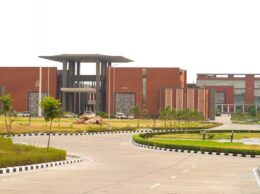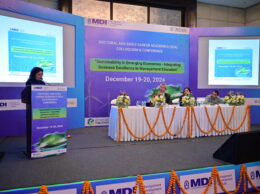Bengaluru: Ankita Dash, a student of the Fellow Programme in Management (FPM), the doctoral programme of Indian Institute of Management Bangalore (IIMB), has won the Best Paper Award at the IIT Kharagpur Management Doctoral Colloquium, held recently. She has won the award for her paper titled ‘To Be or Not To Be in Global Value Chains – Empirical Evidence from Indian Automotive Sector’. Professor Rupa Chanda, RBI Chair in Economics, IIM Bangalore, is Ankita Dash’s faculty mentor.
Ankita’s paper focuses on an examination of factors that affect participation of firms in India in Automotive Global Value Chains. It is based on the first chapter of her dissertation.
Congratulating Ankita on her achievement, Dr. Rejie George Pallathitta, Chairperson, Fellow Programme in Management, IIM Bangalore said: “Ankita’s intense preparation, dedication, focus and analysis on the subject has shown results. Her study can serve as a framework for further in-depth research on the topic.”
Abstract of paper: Global Value Chains (GVCs) are the latest paradigm in production and trade as businesses gain from comparative advantages offered by different geographies through international operations. Rising trade in intermediates has made GVCs central though India’s presence is yet not substantial. GVCs are still a nascent field of study, both in academia and in practice, and more so in developing countries like India where their impact is anticipated to be both significant and essential. The study, through a combination of in-depth discussions and a firm-level survey, aims to explore and understand the factors that either encourage or hinder participation of firms in India in the sectoral GVCs for two chosen sectors – automotive and electronics.
This paper presents the findings from the firms’ perspective as to which factors aid or deter them from participating in Automotive Global Value Chains. The gamut of broad factors covered under this study and analysed using PLS-SEM include institutional, regulatory, financial, trade-related, technological, sectoral and input-related elements; then further categorized into sub-factors. Apart from firm-level characteristics (like firm size, ownership type and location) having an effect on participation, other factors like inputs (vis-a-vis their availability, quality and cost), public institutions (in terms of their efficiency, transparency, etc.), and sectoral traits (like consolidation within the sector and importance of brands) were found to significantly influence participation in auto GVCs.
While trade-related factors (tariff and non-tariff measures) have a positive bearing by encouraging participation, financial factors (especially credit, taxes and foreign exchange rates), technology (ease of access and transfer restrictions), market barriers (market entry costs, capital costs, gestation time of projects, etc.) and product-related factors (like standards compliance, timely delivery) posed major challenges to participation. The study also ascertains the impact of the existing relevant laws for the automotive sector with the manufacturing policy, Motor Vehicles Act 1988 and state government incentives having the most positive impact and with labour laws having the most negative impact. In short, bringing out a comprehensive picture of the factors influencing participation of firms in India in the automotive global value chains has been attempted through this study.









